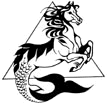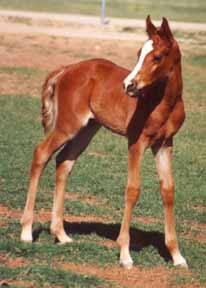
Bint Al Bahr Arabians
Preservation Breeders of Straight Babson Egyptians
 |
Bint Al Bahr Arabians Preservation Breeders of Straight Babson Egyptians |
![]()
Photo Tips - Page 6
The Handlerís Job
The handler's
job at this point is to follow the suggestions of the photographer in posing the
horse and try to keep out of the photo. Not an easy job! The
handler will need to be aware of where their hands are and to do their best to
keep them back away from the horse to avoid them becoming distracting elements
in the final photo. It really helps
the handler if the horse has a good whoa on him. Ask
the photographer if you can stand at the off side hip and still be out the photo
for headshots for a horse that keeps moving forward.
It is also the
handlerís job to recheck the nostrils for dirt as well as check the mane and forelock
to make sure it does not cover the eyes.
 As the photographer, take advantage of the horse freezing into a lovely pose
head or body for longer than you think you need to get the shot you want.
Shoot again after moving a few feet to the left or right.
Crouch down and shoot again. Zoom in or out, slightly reframing the shot.
The subtle differences in each shot will give each frame a different
look. While your first shot may have
the eyes closed the next two shots of the pose may be good, but the fourth might
be the one you had hoped for. In
each shot the horse will vary slightly as will the background.
Donít be afraid of using too many frames on a good ďfrozenĒ pose.
Often those poses will show expression or intensity that will give more
life to your results. That special
look in the eye or curve to the neck may not last more than a second or two, be
ready to capture them. With
headshots shoot both landscape (the greater width of photo is horizontal) and
portrait (vertical) especially if the horse freezes in a good pose.
As the photographer, take advantage of the horse freezing into a lovely pose
head or body for longer than you think you need to get the shot you want.
Shoot again after moving a few feet to the left or right.
Crouch down and shoot again. Zoom in or out, slightly reframing the shot.
The subtle differences in each shot will give each frame a different
look. While your first shot may have
the eyes closed the next two shots of the pose may be good, but the fourth might
be the one you had hoped for. In
each shot the horse will vary slightly as will the background.
Donít be afraid of using too many frames on a good ďfrozenĒ pose.
Often those poses will show expression or intensity that will give more
life to your results. That special
look in the eye or curve to the neck may not last more than a second or two, be
ready to capture them. With
headshots shoot both landscape (the greater width of photo is horizontal) and
portrait (vertical) especially if the horse freezes in a good pose.
Your curser on the photos will tell you more about the photo and the horse.
Go
back to page 1
2 3
4 5
6 7 8
9
![]()